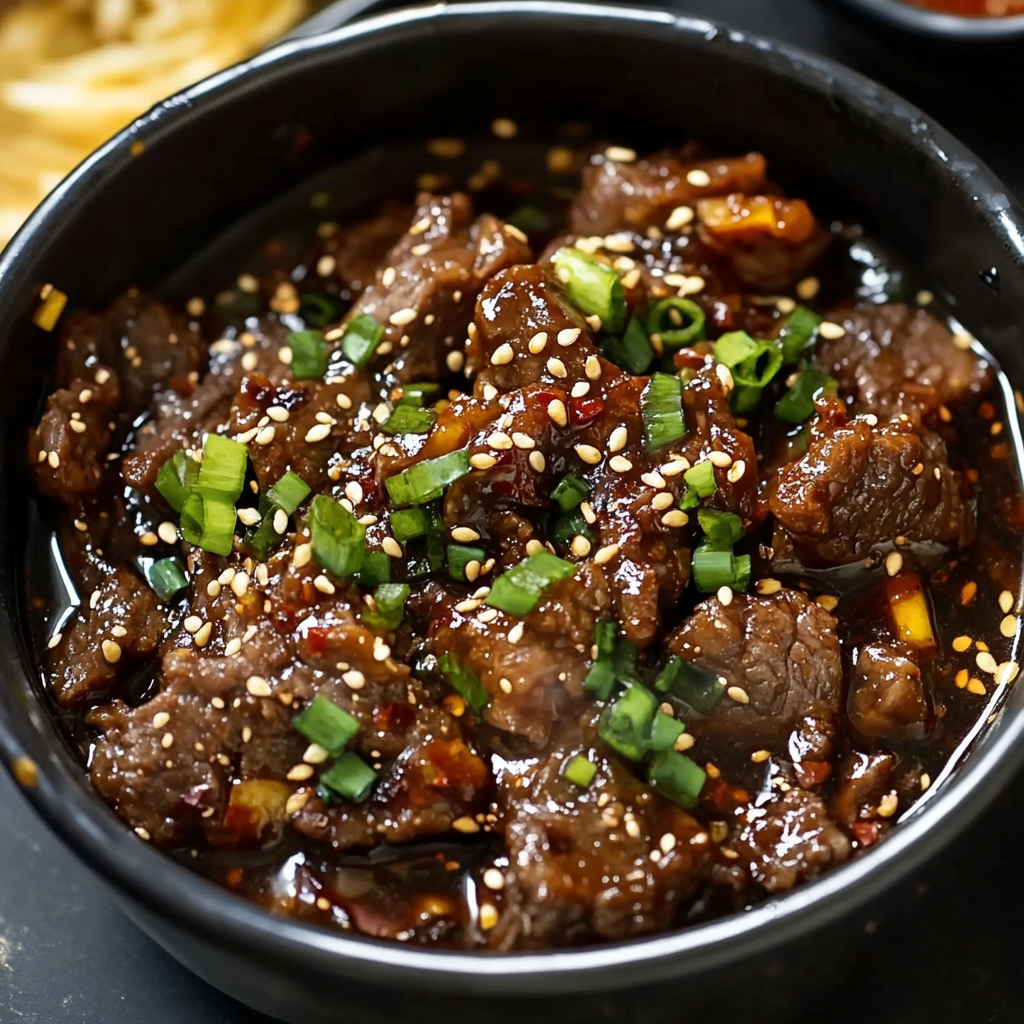Introduction
Have you ever wondered what makes Korean BBQ taste so irresistible? That slightly sweet, garlicky, and savory magic that coats every bite of beef—yep, that’s Bulgogi Sauce (Korean BBQ Beef Sauce). It’s the heart of one of Korea’s most beloved dishes, and the best part? You can make it right at home with simple pantry ingredients.
Imagine this sauce as the soul of Korean BBQ—rich, aromatic, and perfectly balanced. Once you master it, you’ll never go back to store-bought versions again. Whether you’re marinating beef, chicken, or tofu, this sauce brings your meal to life.
In this article, we’ll explore everything about Bulgogi Sauce—its origin, ingredients, preparation, and clever ways to use it beyond BBQ. Ready to dive into the world of Korean flavors? Let’s get started!
1. What Is Bulgogi Sauce (Korean BBQ Beef Sauce)?
Bulgogi Sauce (Korean BBQ Beef Sauce) is a flavorful Korean marinade traditionally used for grilling thin slices of beef. “Bulgogi” literally means “fire meat,” referring to the method of cooking meat over open flames. The sauce combines sweet, savory, and umami-rich notes, resulting in a perfectly balanced marinade that caramelizes beautifully when cooked.
It’s not just a sauce—it’s an experience. Think of it as the secret handshake between meat and flavor that creates the unforgettable taste of Korean BBQ.
2. A Brief History of Bulgogi
Bulgogi dates back nearly a thousand years, originally enjoyed by Korean royalty during the Goguryeo era. Over time, it became a beloved dish for all, evolving from open-flame roasting to modern grill and pan-fried styles.
The sauce itself reflects Korea’s culinary philosophy: balance, harmony, and depth. It’s a symbol of Korea’s love for transforming simple ingredients into rich, flavorful dishes.
3. The Magic Behind Bulgogi Sauce
At its core, Bulgogi Sauce is all about balance. The sweetness from sugars and pear, the saltiness of soy sauce, and the kick from garlic and ginger—all come together like a perfectly tuned orchestra.
When you marinate beef in it, the enzymes from the pear naturally tenderize the meat, making it juicy and flavorful. As it cooks, the sugars caramelize, giving the beef that irresistible glossy finish.
4. Essential Ingredients for Authentic Flavor
Here’s the exact ingredient list you’ll need to create the authentic flavor of Bulgogi Sauce (Korean BBQ Beef Sauce):
Ingredients:
1/2 cup soy sauce
3 tablespoons white sugar
2 tablespoons brown sugar
2 tablespoons minced garlic
1 tablespoon grated ginger
1 tablespoon sesame oil
2 tablespoons mirin (or sweet rice wine)
1 tablespoon rice vinegar
1 pear (Asian pear preferred), grated
1 teaspoon ground black pepper
2 green onions, finely chopped
1 teaspoon sesame seeds (optional)
Each ingredient plays a vital role. Soy sauce gives depth, sugars balance saltiness, garlic and ginger add warmth, and the pear adds that distinctive sweetness and tenderness unique to Korean BBQ.
5. Step-by-Step Instructions
Here’s how to make your own Bulgogi Sauce (Korean BBQ Beef Sauce) at home:
Mix Soy Sauce & Sugars: In a bowl, combine soy sauce, white sugar, and brown sugar until the sugars dissolve.
Add Aromatics: Stir in minced garlic, grated ginger, and sesame oil.
Incorporate Liquids: Add mirin and rice vinegar to the mixture.
Add Pear: Mix in the grated pear for sweetness and tenderizing.
Season: Stir in ground black pepper, chopped green onions, and sesame seeds if using.
Marinate & Cook: Use the sauce to marinate beef slices for at least 30 minutes before grilling or frying.
Enjoy your homemade Korean BBQ masterpiece!
6. Why the Grated Pear Matters
The pear isn’t just a sweet touch—it’s a natural tenderizer. Korean cooks have used Asian pears for centuries to break down tough meat fibers. It’s like nature’s gentle hand softening your beef without changing its texture.
If you can’t find an Asian pear, a ripe Bosc pear or even a small apple can work as a substitute.
7. Tips for Marinating Beef Perfectly
Use thinly sliced beef ribeye or sirloin for best results.
Marinate for at least 30 minutes, but for deeper flavor, 2–4 hours is ideal.
Don’t over-marinate overnight, as the fruit acids can make the texture too soft.
Grill on high heat for that caramelized char and smoky aroma.
Think of marinating like a good friendship—it needs time and balance to develop beautifully.
8. Variations of Bulgogi Sauce
You can easily tweak Bulgogi Sauce to suit your taste or dietary needs:
Spicy Version: Add gochujang (Korean chili paste) or red pepper flakes.
Low-Sodium Version: Use low-sodium soy sauce and reduce sugars slightly.
Vegan Option: Replace mirin with apple juice and use the sauce for tofu or mushrooms.
Gluten-Free Version: Use tamari instead of soy sauce.
This sauce is flexible, forgiving, and fun—perfect for experimenting!
9. How to Store Bulgogi Sauce
You can make Bulgogi Sauce in batches and store it for future use:
Refrigerator: Store in an airtight jar for up to 1 week.
Freezer: Pour into an ice cube tray and freeze for up to 3 months.
Pro tip: Freeze small portions so you can quickly defrost just what you need for a weeknight dinner.
10. Creative Ways to Use Bulgogi Sauce
Bulgogi Sauce isn’t just for beef! Try it in these delicious ways:
Stir-Fry: Use it as a base for veggie or noodle stir-fries.
Burger Glaze: Brush it over burgers for an Asian twist.
Dipping Sauce: Mix with a little mayo or yogurt for a flavorful dip.
Grilled Chicken or Shrimp: The sauce caramelizes beautifully on any protein.
Rice Bowls: Drizzle it over rice, kimchi, and fried eggs for a quick Korean-style bowl.
It’s like having a culinary passport to Seoul right in your kitchen!
11. Common Mistakes to Avoid
Using too much soy sauce: It can overpower the sweetness.
Skipping the pear: You’ll lose that signature tender texture.
Overcooking the beef: Bulgogi should be juicy, not dry.
Not mixing sugars properly: Undissolved sugars can burn while cooking.
Always taste your sauce before marinating—it should feel balanced and harmonious.
12. Health Benefits of Bulgogi Sauce Ingredients
This sauce isn’t just delicious—it’s surprisingly wholesome:
Garlic & Ginger: Natural anti-inflammatory and immune-boosting properties.
Soy Sauce: Source of amino acids and antioxidants (in moderation).
Sesame Oil: Rich in healthy fats and vitamin E.
Pear: Adds natural sweetness and fiber.
Who said comfort food can’t be healthy?
13. Perfect Pairings with Bulgogi
To create a restaurant-quality Korean BBQ experience, pair your Bulgogi Sauce (Korean BBQ Beef Sauce) dishes with:
Steamed Rice or Fried Rice
Kimchi or Pickled Vegetables
Korean Lettuce Wraps (ssam)
Glass Noodles (Japchae)
Korean Pancakes (Pajeon)
Together, these sides turn your meal into a true Korean feast.
14. Homemade vs. Store-Bought Sauce
Homemade:
Fresher taste, customizable sweetness and spice
No preservatives or artificial flavors
Store-Bought:
Convenient but often too salty or sweet
May contain additives and MSG
If you value authenticity and health, homemade Bulgogi Sauce wins hands down.
15. Conclusion and Final Thoughts
Bulgogi Sauce (Korean BBQ Beef Sauce) is more than a recipe—it’s a gateway into Korean culinary culture. Simple, flavorful, and endlessly versatile, it transforms any ordinary meal into something extraordinary.
Once you make it yourself, you’ll realize how rewarding it feels to control every flavor, every ingredient, every drop of deliciousness. So the next time you crave Korean BBQ, skip the takeout and fire up your own grill. Your taste buds will thank you.
Frequently Asked Questions (FAQs)
1. Can I use Bulgogi Sauce for chicken or pork?
Absolutely! The sauce works beautifully with chicken, pork, or even tofu. Just adjust marinating time depending on the protein.
2. How long should I marinate the beef in Bulgogi Sauce?
At least 30 minutes, but ideally 2–4 hours. This allows the flavors to soak in deeply.
3. Can I make Bulgogi Sauce without pear?
Yes, but you’ll lose a bit of tenderness and sweetness. Substitute with grated apple or kiwi if needed.
4. Is Bulgogi Sauce gluten-free?
Not by default since soy sauce contains gluten. Use tamari for a gluten-free version.
5. Can I reuse Bulgogi marinade after using it on raw meat?
No, always discard marinade that has touched raw meat. If you want to use it as a glaze, make a separate batch or boil it first.
In short: Once you make your own Bulgogi Sauce (Korean BBQ Beef Sauce), you’ll realize it’s not just a condiment—it’s a flavor revolution waiting in your kitchen.







